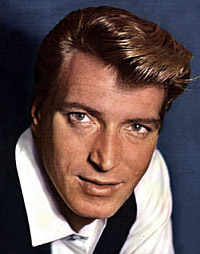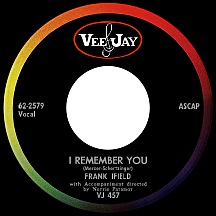FRANK IFIELD
I Remember You
Let's talk about yodeling for a minute. This style that alternates between a singer's regular voice with much higher notes delivered in a rapid-fire manner has, it's been claimed, been around perhaps a hundred centuries or longer. In various cultures worldwide, it became a way for people to communicate over long distances, particularly in mountainous areas and other places prone to a natural echo effect. In modern culture it has been identified with rural areas of the Swiss Alps and Germany; classical composers of the last 200 years have been known to incorporate it into their works. Many country singers did their fair share of yodeling including the "Singing Brakeman" of the '20s and '30s, Jimmie Rodgers, as well as Gene Autry, Hank Williams and Slim Whitman. The Trapp Family Singers, active from the mid-'30s through '50s (their story was adapted for the 1959 musical and 1965 film versions of The Sound of Music), had much to do with popularizing the style in later years. Then we have Francis "Frank" Ifield, another singing star who kept the sound accessible, taking it to the top of the music charts in the 1960s.
Born in 1937 in Coundon in England's West Midlands, he lived as a child in Dural, New South Wales, near Sydney, Australia. Inspired by some of the '50s era country singers, Frank taught himself to yodel during his teenage years. His grandfather, who toured with minstrel shows when he was very young, was a large influence. Starting with a ukulele his parents bought him at age eleven, he graduated to guitar a year later. At 14 he received national exposure on Australian radio 2GB's Amateur Hour and in 1955, just out of high school, secured a contract with Regal Zonophone Records. Early performances, both live and on the radio, took place mainly in the Sydney area; an appearance on TCN-9's short-lived TV series Campfire Favorites in 1956 led to many other guest appearances on the tube.
EMI (Regal Zonophone's parent company) moved him to the Columbia label in 1958, where his output consisted mostly of country remakes and covers like Williams' "Kaw-Liga" and Eddy Arnold's "Chip Off the Old Block." In 1959 he hired a new manager, Peter Gormley, who arranged a flight to England in hopes of breaking the young Aussie star in a more prominent world market. After a number of BBC-TV appearances he began working with Norrie Paramor, an A&R director and music arranger headquartered at EMI-Columbia's main offices in the U.K. In early 1960, "Lucky Devil" (by prolific New York-based songwriters Aaron Schroder and Wally Gold, responsible for hits by many top stars, most notably Elvis Presley) rose to the top 30 on the U.K. charts (it was concurrently a hit in the U.S. for Carl Dobkins, Jr.). Follow-up "Happy-Go-Lucky Me" (covering a U.S. hit by Paul Evans) didn't fare as well, but the third single, a cover of teen-style singer Van Strickland's "Gotta Get a Date," managed a top 50 showing.
Whiplash, a western TV series produced in England, set in Australia and starring American Peter Graves, premiered in the U.K. in the ATV network and ran a full season; Ifield performed the title theme. Besides the weekly airing of this song, 1961 proceeded quietly with four unsuccesful single releases including a cover of Jerry Wallace's "Life's a Holiday" and an original Frank had written, "Your Time Will Come." In the summer of 1962 Ifield, in danger of being dropped by EMI, slipped a slight yodel into "I Remember You," a song written in 1941 (music by film director Victor Schertzinger), its lyrics penned by Johnny Mercer, who later revealed he wrote it for Judy Garland, his love interest at the time. 21 years later, Ifield's version suddenly became one of Britian's all-time top-selling records. Despite a seven-week run at number one and million-selling status in Britain, the song met with resistance from potential distributors in the States. Vee-Jay Records, primarily a rhythm and blues label based in Chicago, took on the record, which reached the top five on the Hot 100 in October, as well as number one on the Easy Listening chart.
Then he increased the yodel quotient on Hank Williams' 1949 smash "Lovesick Blues" and scored a follow-up chart-topper in the U.K. for five weeks in November and December. The disc also did well in the U.S., reaching the top 50. Flip side "She Taught Me How to Yodel" (in the U.K. but not U.S.) went off the scale as a yodeling tutorial with large doses of the technique (double-timed at one point). Gormley warned against making this performance public, certain it would kill Frank's career...but Queen Elizabeth had a different reaction, requesting he perfom the song at a November '62 performance for the Royal Family, which became one of the great moments of Ifield's life. Next up: "The Wayward Wind," a remake (without any anticipated yodeling) of Gogi Grant's massive '56 hit, which completed a hat trick when it became his third consecutive U.K. chart-topper in February 1963, gaining him a listing in the Guinness Book of World Records as the first music act to achieve this feat. At about that time, an up-and-coming quartet from Liverpool opened for him on a one-night show. Soon he would be facing formidable competition from The Beatles in the race for the coveted number one spot.

"Nobody's Darlin' But Mine" (a top 20 pop hit in 1937 for country singer and later Louisiana governor Jimmie Davis) marked a move to the country preference of Frank's youth and still might have reached the top of the charts in May of '63 if not for the aforementioned Beatles (with "From Me to You"), their main competitors Gerry and the Pacemakers ("How Do You Do It?") and American country hitmaker Ned Miller ("From a Jack to a King") holding Ifield's single at a number four. He could see the trend shifting with the rise in popularity of U.K. rock groups (several others already right behind him on their way up). But to his surprise, "Confessin' (That I Love You)" (a standard from 1930 that became a hit that year for Guy Lombardo and Rudy Valleé, in '37 for Lionel Hampton, in '45 for Perry Como and again in '52 for Les Paul and Mary Ford) landed him in the U.K.'s number one spot for the fourth time, less that a year before his first trip to the top. In the U.S. it was released as "I'm Confessin'" as his fifth Vee-Jay single, but then it was picked up by Capitol (who'd always had first option) and became a mid-charting hit.
Afterwards he had a tougher time getting airplay and sales paled in comparison to the the yearlong peak. An updated rendition of Frankie Laine's '49 hit "Mule Train" (with an organ part that sounds suspiciously like a theremin!) reached the top 30 but was passed over in the U.S. for "Please," a song more in line with "I'm Confessin'" that barely made the Billboard tabulation. "Don't Blame Me" (a Dorothy Fields-Jimmy McHugh song that went top ten in 1933 for both Lombardo and Ethel Waters and was later popularized by Nat "King" Cole" in '48 and The Everly Brothers 14 years later) became Ifield's final top ten in his native England.
When the Beatles took over the American music scene in early '64, Vee-Jay Records (with time still left on the the contract to release songs they had licensed by both acts), in one of many attempts to milk the Fab Four for the maximum moolah admissible before their end-of-the-year cutoff, released an album, Jolly What! England's Greatest Recording Stars the Beatles & Frank Ifield On Stage, with four Beatles tunes (easily found elsewhere) and eight Frank tracks; the back cover has an embarrassingly-misspelled tagline: "It is with a good deal of pride and pleasure that this copulation has been presented."
In 1964 and '65, Ifield had four more top forty hits in his homeland ("Angry at the Big Oak Tree," "I Should Care," "Summer is Over" and "Paradise"). The film industry came calling and he took a starring role in Up Jumped a Swagman, a musical comedy loosely based on his own path from Australia to England in search of singing success (Gillian Bowden, his wife of just a few months, had a small role as a dancer). The movie was panned by critics but is worth a look for the twelve songs he performed (released as a Columbia U.K. soundtrack), including "I Remember You." Afterwards, Frank headed to Nashville with the goal of going fully into country music. Welcomed with open arms, he was soon performing at the Grand Ole Opry. Wesley Rose signed him to the Hickory label (in England the records continued appearing on Columbia) and he had several country hits over the next three years, the biggest being "No One Will Ever Know" and Leon Payne's "Call Her Your Sweetheart" in 1966. This period has been referred to as his "yodeling cowboy years."
He remained with Hickory through 1971 (while making a switch back home to Decca Records in '69), then spent the remainder of the 1970s hopping from the MAM label to Spark (where he recorded a "New 1975 version" of his signature hit "I Remember You") to Warner Bros. in 1979. Frank slowed things down in the 1980s but made a number of high-profile concert appearances and occasionally performed on television specials. He contracted, and survived, a serious case of pneumonia and the loss of part of a lung, though it took a few years to recover, during which time he couldn't sing due to damage the operation had done to his vocal cords. In 1991, Frank Ifield returned to the British top 40 with a dance remix by The Backroom Boys using the original recording of his most vocally acrobatic song, "She Taught Me How to Yodel."


